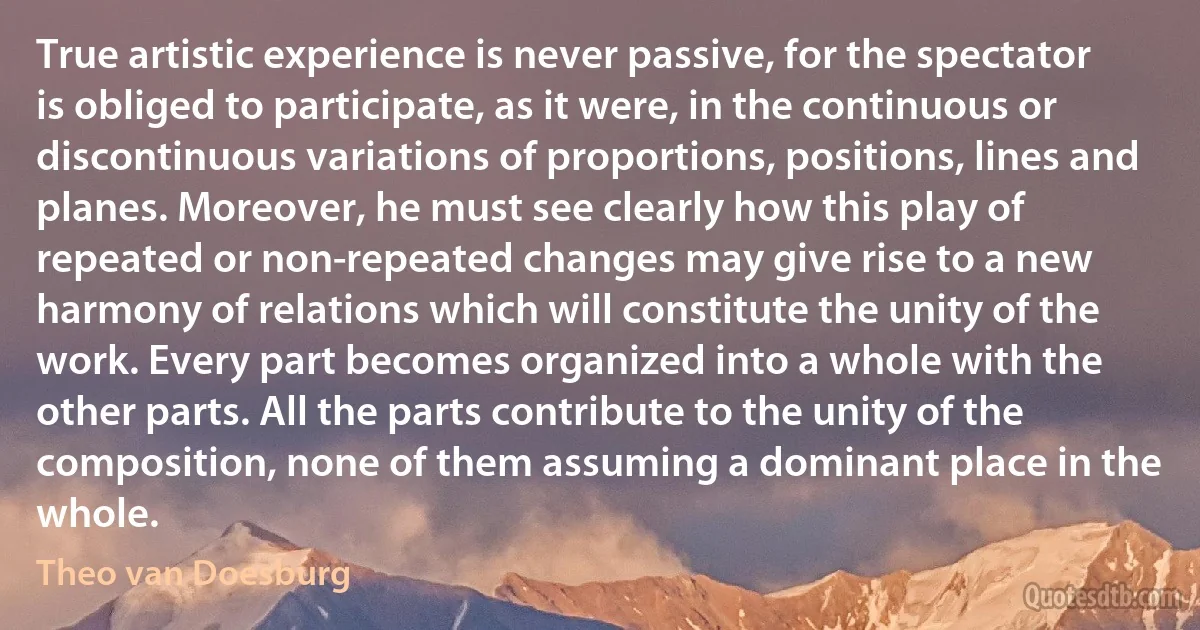
True artistic experience is never passive, for the spectator is obliged to participate, as it were, in the continuous or discontinuous variations of proportions, positions, lines and planes. Moreover, he must see clearly how this play of repeated or non-repeated changes may give rise to a new harmony of relations which will constitute the unity of the work. Every part becomes organized into a whole with the other parts. All the parts contribute to the unity of the composition, none of them assuming a dominant place in the whole.
Theo van DoesburgRelated topics
composition dominant experience harmony none place play rise see work relations parts proportionsRelated quotes
Cupid and my Campaspe play'd
At cards for kisses-Cupid paid:
He stakes his quiver, bow, and arrows,
His mother's doves, and team of sparrows;
Loses them too; then down he throws
The coral of his lips, the rose
Growing one's cheek (but none knows how);
With these, the crystal of his brow,
And then the dimple of his chin:
All these did my Campaspe win.
At last he set her both his eyes-
She won, and Cupid blind did rise.
O Love! has she done this for thee?
What shall, alas! become of me?

John Lyly
The empire of Saturnus is gone by;
Lord of the secret birth of things is he;
Within the lap of earth, and in the depths
Of the imagination dominates;
And his are all things that eschew the light.
The time is o'er of brooding and contrivance,
For Jupiter, the lustrous, lordeth now,
And the dark work, complete of preparation,
He draws by force into the realm of light.
Now must we hasten on to action, ere
The scheme, and most auspicious positure
Parts o'er my head, and takes once more its flight,
For the heavens journey still, and adjourn not.

Friedrich Schiller
Dialectical logic undoes the abstractions of formal logic and of transcendental philosophy, but it also denies the concreteness of immediate experience. To the extent to which this experience comes to rest with the things as they appear and happen to be, it is a limited and even false experience. It attains its truth if it has freed itself from the deceptive objectivity which conceals the factors behind the facts - that is, if it understands its world as a historical universe, in which the established facts are the work of the historical practice of man.

Herbert Marcuse
On this question of principle, while actual suffering was yet afar off, they the Colonies raised their flag against a power to which, for purposes of foreign conquest and subjugation, Rome in the height of her glory is not to be compared,a power which has dotted over the surface of the whole globe with her possessions and military posts, whose morning drum-beat, following the sun, and keeping company with the hours, circles the earth with one continuous and unbroken strain of the martial airs of England.

Daniel Webster
The assumption that effective cartographic technique and its evaluation is based in part on some subjective artistic or aesthetic sense on the part of the cartographer and map reader is somewhat disconcerting. For example, E. Raisz claims that the "effective use of lines or colors requires artistic judgment,” and J. K. Wright explains that the suitability of a symbol "depends on the map maker's taste and sense of harmony.” Throughout the literature there are numerous similar assertions regarding the assumed subjective aesthetic and artistic content of cartography.

Arthur H. Robinson
